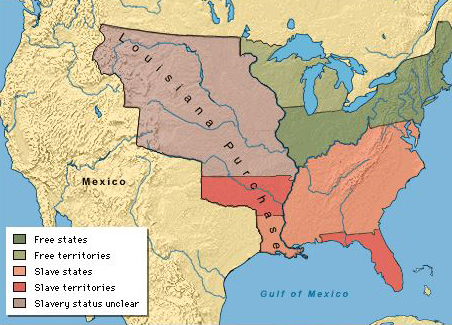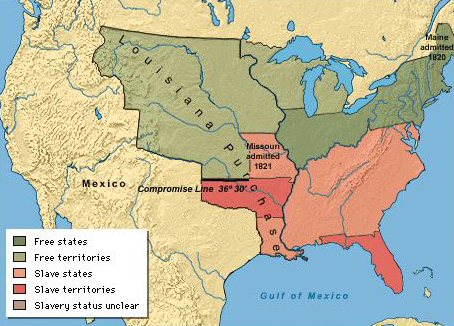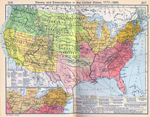|
Missouri Compromise 1820
The Missouri Compromise of 1820 was an act of Congress, signed by
U.S. President
 James Monroe on March 6, 1820.
James Monroe on March 6, 1820.
The issue was slavery. The United
States didn't settle in favor for or against slavery, but with a
compromise.
|
|
Congressman
Henry Clay
from Kentucky gets most of the credit for bringing
about the
Missouri Compromise of 1820.
 John Quincy Adams
called it "a title-page to a great tragic
volume."
John Quincy Adams
called it "a title-page to a great tragic
volume."
Unfortunately,
Adams was right. |
In a
Nutshell
The territory of
Missouri tried unsuccessfully to join the Union,
because Congress was gridlocked over a possible anti-slavery
amendment to Missouri's new state constitution.
Why the gridlock?
The United States at the time
consisted of 22 states that were evenly divided on the matter: 11
free states and 11 slave states. An additional slave state,
therefore, would have tipped the balance.
A solution presented itself when Maine
wanted to break away from Massachusetts and become a state as well.
The compromise was to accept Missouri as a slave state and Maine as
a free state.
Monroe signed the bill on March 6,
1820.
Maine became the 23rd state to join
the Union on March 15, 1820.
Missouri became the 24th state to join
the Union on August 10, 1821. Missouri's admission was delayed
because it had a problem with the concept of free blacks. Once it
was agreed that free blacks would be treated as regular citizens,
statehood was granted.
The
Missouri
Compromise Line
In addition, the Missouri Compromise
of 1820 disallowed slavery in all new territory that
was acquired by the
 Louisiana Purchase and situated
north of the 36°30' parallel, with the exception of Missouri.
Louisiana Purchase and situated
north of the 36°30' parallel, with the exception of Missouri.
36°30' latitude corresponds with
Missouri's southern border. See map below.
The Missouri Compromise of 1820 was
repealed by the
 Kansas-Nebraska Act of 1854.
Kansas-Nebraska Act of 1854.
Maps

Map of the United
States BEFORE the Missouri Compromise of 1820
Copyright University of Oregon

Map of the United
States AFTER the Missouri Compromise of 1820
Illustrating the parallel at
36°30', which corresponds
with the southern border of Missouri.
Copyright University of Oregon
And one more map:

1777-1865 United
States Slavery and Emancipation
Missouri and
Observations by Experts
People who had a clue, knew that the
Missouri question was bad news.
On April 22, 1820,
 Thomas Jefferson
wrote to John Holmes
that,
Thomas Jefferson
wrote to John Holmes
that,
this
momentous question, like a fire bell in the
night, awakened and filled me with terror. I
considered it at once as the knell of the
Union. It is hushed indeed for the moment.
But this is a reprieve only, not a final
sentence.
And the following is
 John Quincy Adams' journal
entry from January 10, 1820:
John Quincy Adams' journal
entry from January 10, 1820:
The
Missouri question has taken such hold of my
feelings and imagination that, finding my
ideas connected with it very numerous, but
confused for want of arrangement, I have
within these few days begun to commit them
to paper loosely as they arise in my mind.
There are views of the subject which have
not yet been taken by any of the speakers or
writers by whom it has been discussed —
views which the time has not yet arrived for
presenting to the public, but which in all
probability it will be necessary to present
hereafter.
I take it for granted that the present
question is a mere preamble — a title-page
to a great tragic volume. I have hitherto
reserved my opinions upon it, as it has been
obviously proper for me to do. The time may,
and I think will, come when it will be my
duty equally clear to give my opinion, and
it is even now proper for me to begin the
preparation of myself for that emergency.
The President thinks this question will be
winked away by a compromise. But so do not
I. Much am I mistaken if it is not destined
to survive his political and individual life
and mine.
More
 Go here for the Missouri
Compromise page, provided by the University of Oregon.
Go here for the Missouri
Compromise page, provided by the University of Oregon.
Here is the text of the
 Missouri Compromise of 1820,
provided by the Library of Congress.
Missouri Compromise of 1820,
provided by the Library of Congress.
Here is more on the
 American Civil War.
American Civil War.
And here is more on
 Slavery and Abolition.
Slavery and Abolition.
More History
|